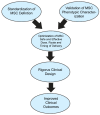Mesenchymal Stromal Cells in Ischemic Brain Injury
- PMID: 35326464
- PMCID: PMC8947674
- DOI: 10.3390/cells11061013
Mesenchymal Stromal Cells in Ischemic Brain Injury
Abstract
Ischemic brain injury represents a major cause of death worldwide with limited treatment options with a narrow therapeutic window. Accordingly, novel treatments that extend the treatment from the early neuroprotective stage to the late regenerative phase may accommodate a much larger number of stroke patients. To this end, stem cell-based regenerative therapies may address this unmet clinical need. Several stem cell therapies have been tested as potentially exhibiting the capacity to regenerate the stroke brain. Based on the long track record and safety profile of transplantable stem cells for hematologic diseases, bone marrow-derived mesenchymal stromal cells or mesenchymal stromal cells have been widely tested in stroke animal models and have reached clinical trials. However, despite the translational promise of MSCs, probing cell function remains to be fully elucidated. Recognizing the multi-pronged cell death and survival processes that accompany stroke, here we review the literature on MSC definition, characterization, and mechanism of action in an effort to gain a better understanding towards optimizing its applications and functional outcomes in stroke.
Keywords: brain injury; mesenchymal stem cells; mesenchymal stromal cells; stem cells; stroke.
Conflict of interest statement
The authors declare no conflict of interest.
Figures


References
Publication types
MeSH terms
Grants and funding
LinkOut - more resources
Full Text Sources
Medical

